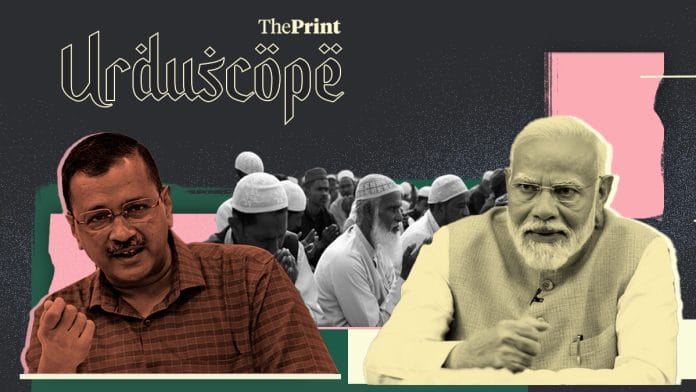New Delhi: The ongoing general elections dominated the Urdu Press this week. From criticising the new report published by the Prime Minister’s Economic Advisory Council (PM-EAC) on the “increase” in Muslim population to welcoming Delhi Chief Minister Arvind Kejriwal’s release from jail to a purported change in public mood in favour of the Opposition as elections take place — here are this week’s big stories in the Urdu press.
In its paper this month, the EAC claimed that India’s share of Hindu population fell 7.8 percent between 1950 and 2015, while that of Muslims increased by 43 percent over the same period.
On 11 May, Inquilab printed an editorial titled ‘The Bogey of Muslim Population’, in which the newspaper criticised the government’s stance asking why only population data is being released if data is to be published at all.
Why not release data on unemployment, inflation, poverty, the condition of small industries, or the impact of demonetisation, which are all public issues, it wondered.
“The central government has never issued a white paper on several important issues, such as the situation in Manipur or the problems of farmers, despite the insurgency in Manipur and farmers sitting on Delhi’s borders for over a year. Did the ruling party pre-emptively task them with releasing their research paper amidst the elections,” it asked.
Also Read: ‘How will the truth come out?’ — Urdu press on sexual harassment allegation against Bengal governor
Kejriwal’s release
In its 13 May editorial, Roznama Rashtriya Sahara pondered over whether Delhi Chief Minister Arvind Kejriwal’s release from jail would alter India’s electoral landscape.
His absence from government duties could draw him closer to the Aam Aadmi Party, allowing him to focus more on party affairs and campaign freely. Despite limitations on certain issues, his reactivation could invigorate both the party and the Opposition, it said, adding that Kejriwal’s swift return has already energised the AAP’s election campaign, potentially influencing the remaining one-third of seats yet to be contested.
In its 11 May editorial, Siasat emphasised the impact of Kejriwal’s release from jail, highlighting his ability to sway public opinion by exposing the BJP’s alleged misdeeds. “Kejriwal engages with the public, discussing development in Delhi and addressing corruption charges, while boldly criticising alleged corruption in BJP-ruled states. This outspokenness likely explains why the BJP sought to restrict his campaigning,” it said.
Full of lies, lacking in steam — BJP’s poll campaign
Inquilab’s 13 May editorial highlighted a key aspect of this general election, noting that despite the looming threat of the Enforcement Directorate (ED), the Central Bureau Investigation (CBI), fear of arrest, lack of resources, and other new accusations, Opposition leaders are united and vigorous in their attack of the BJP.
“A group of young leaders is acting as if everyone knows their role and what to do. There has never been such harmony and unity among opposition parties in any past election as there is now. This is the first election that defines and redefines the history of political and electoral unity, suggesting that its impact will be evident to the public on 4 June,” the editorial said.
Sahara editorial titled ‘The Fear of Amrit’ on 16 May wrote of PM Narendra Modi’s apparent desire for sole leadership, as ‘One Nation, One Leader’. It suggested that Modi aims to eliminate opposition forces, including those within his own party, to maintain power.
“The truth is Prime Minister Narendra Modi cannot risk having any other leader around him. He wants his decision to be final, and everyone else to agree with him and remain loyal to him. He desires to be the sole leader of the party and the country for his entire life,” it wrote.
Another editorial in the same newspaper the next day suggested that the Modi government’s tactics in the general elections are losing effectiveness.
“Lies and deceit are being exposed, prompting not just anger but also awakening among various communities, including the Bhatt community. Open debates in Varanasi, Modi’s parliamentary constituency, are posing tough questions for the Prime Minister himself. Former supporters expressing regret over unfulfilled promises, like affordable fuel prices, indicate growing dissatisfaction,” it said.
Election Commission
In their editorials on 15 May, both Inquilab and Sahara raised concerns about the rising hate speech and the “flagrant misuse” of religion to get votes. It was referring to Modi’s election speech in Rajasthan’s Banswara last month in which he claimed that if the Congress came to power, it would redistribute people’s wealth among Muslims and “not even spare your mangalsutra”.
Inquilab’s editorial criticised the Election Commission, stating that if transparent and fair voting does not occur, the election body must be held accountable. Previously, its impartiality and effectiveness in ensuring peaceful elections have been questioned, the editorial said.
“However, this time, the Commission is blatantly becoming a tool of the ruling party, neglecting its duties and impartiality. Despite accusations against political parties for inciting religious sentiments for votes, the Commission took no action.”
Siasat’s editorial the same day stressed the EC’s duty to enforce laws and maintain fairness in elections.
“However, flagrant violations of the election code of conduct, including seeking votes on religious grounds, are rampant in the ongoing parliamentary elections. Leaders must ensure the law is upheld, yet instances of religious manipulation persist, such as intimidating Muslims or leveraging temples for votes. This misuse of religion undermines the democratic process and must be addressed promptly,” it said.
(Edited by Uttara Ramaswamy)
Also Read: Urdu press worries about low voter turnout in LS polls — ‘weakens democratic processes’






